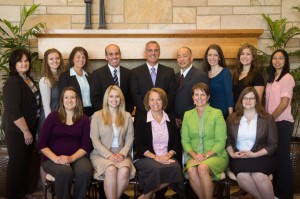
BYU’s relationship managers are second to none at hooking students up … with a career.
Perhaps surprisingly for some, BYU hasn’t invested in full-time “love gurus” but has “career gurus” on lock. BYU Career Services has rechristened its counselors as “career relationships managers” because they do more for students than counsel them on which classes to take. They essentially set students up on “blind dates” with potential employers and make sure they’re on their “A-game.”
Jodi Chowen, the new director of University Career Services, is behind the strategic shift from career counselor status to career relationship manager. She explained why “relationship manager” is a more accurate title for what her team is involved in.
“Traditionally, career counselors are known for their involvement, mostly on the student side,” Chowen said. “The goal with the new title of ‘career relationships managers’ is to empower our staff to be managers of career processes for the people we assist.”
Career relationship managers will help students search for jobs and help employers connect to globally prepared candidates through on-campus recruitment, interviews and internships.
“This requires a lot of relationship building so that our CRMs will be a trusted source for careers from any one of these constituencies,” Chowen said.
Monte Marshall, who specifically assists engineering students, said helping students secure a good career takes three steps: working with students individually, working with campus entities and career fairs and facilitating employer relations.
“That’s a really big part of what we do — going out, selling BYU to great employers, trying to find the very best opportunities for our students to go forth and serve — to have opportunities where they can really have an influence,” Marshall said.
With approximately 30,000 students, BYU has only seven career relationship managers, but they don’t work alone. BYU also has a recruiting services team dedicated to facilitating employers’ recruiting needs.
Tony Jewkes is the manager of employer and external relations and oversees the team that coordinates all BYU job postings and recruiting activities such as interviews, information sessions and the general career fair. Jewkes tries to convince employers to invest the time and expense required to visit Provo and meet BYU students.
“BYU graduates are prepared, professional and principled,” Jewkes said. “What has been most effective is to share what I’ve learned from other employers who have hired BYU students in the past.”
Marshall said some strive to convince employers to hire just one intern from BYU because if they do, they’ll want more. One example is the team of BYU graduates working for the Discovery Channel. Management started by hiring one unpaid intern and was so impressed that they kept coming back to BYU for more — not just for interns, but for full-time employees as well.
Career Services works closely with the Marriott School of Management, which has its own career center, but most of its principles are the same as those of the main campus.
Logan Foutz, a recent Marriott School graduate from Farmington, New Mexico, began working for CSX, one of the nation’s leading transportation suppliers, when he graduated. Of more than 1,600 applicants from all over the country, three of the seven hired at CSX were BYU graduates. Foutz attributed this to BYU’s services.
“Getting a job is about who you know and how they perceive you,” Foutz said. “BYU does a good job perfecting your attributes and displaying them. Mock interviews helped a ton,” he said.
While doing well in class and graduating is important, competition for jobs is a problem. So what can students do to stand out?
“Students … need to be thinking ‘career’ early on. You need to be thinking: ‘How do I build my resume?’ Why are employers going to choose you? Just part-time work, an internship or those kinds of things make all the difference,” Marshall said.
Marshall’s second suggestion is that students recognize available resources to help with career development and getting hired after college. He also suggested using “The Bridge” at bridge.byu.edu that was released this spring.
“If you want to interview with a company that’s coming to campus, that’s where you’ll sign up for interviews. That’s where you’ll find out about career fairs,” Marshall said.
McKenzie Lawyer Davies is the career relationship manager assigned to to the Family, Home and Social Sciences Department. She also works with the Kennedy Center for International Studies.
“Studying abroad is a huge asset,” Davies said. “Employers want students with well-rounded experience. A study abroad is a great way to show that you have a well-rounded education, cultural competencies and that you work hard. It can help with language acquisition, which is one of the ‘number one’ skills BYU produces.”
Davies attested to the perks of study abroad programs from personal experience.
“When interviewing with a government agency in graduate school for a very competitive internship, my interviewers only asked questions about my time in Spain,” she said. “International experience is a way to demonstrate further skills, interests and competencies.”
The “career gurus” are dedicated to the success of BYU students. Students can take advantage of their services and let them manage their relationships with future employers.
More information can be found at ucs.byu.edu and the Career Services office in 2400 WSC.




